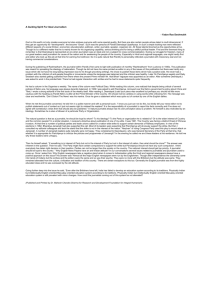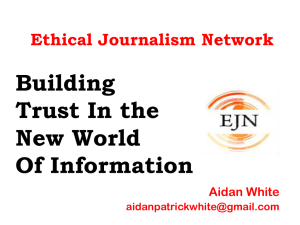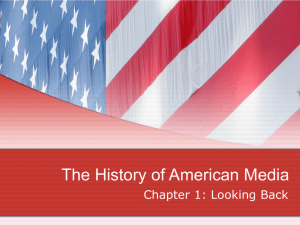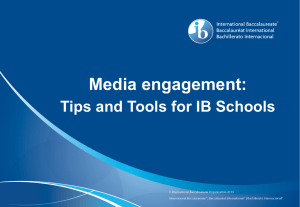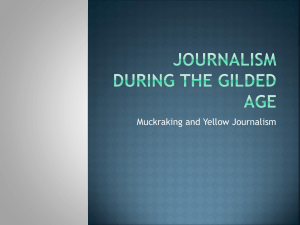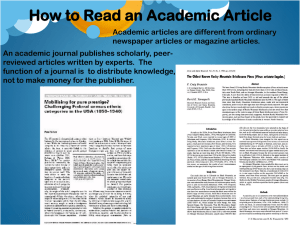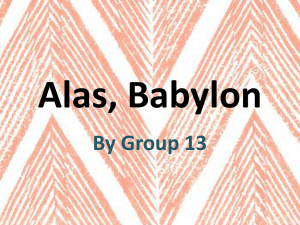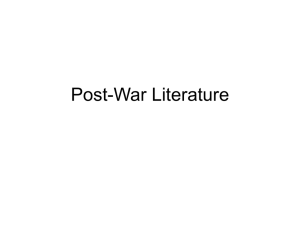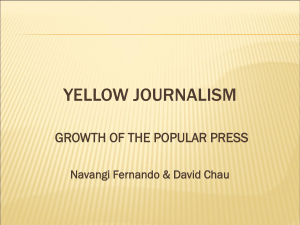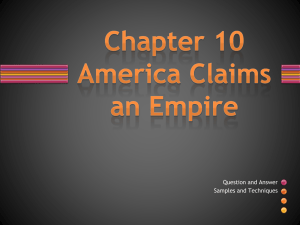Journalists on the verge of a nervous breakdown
advertisement
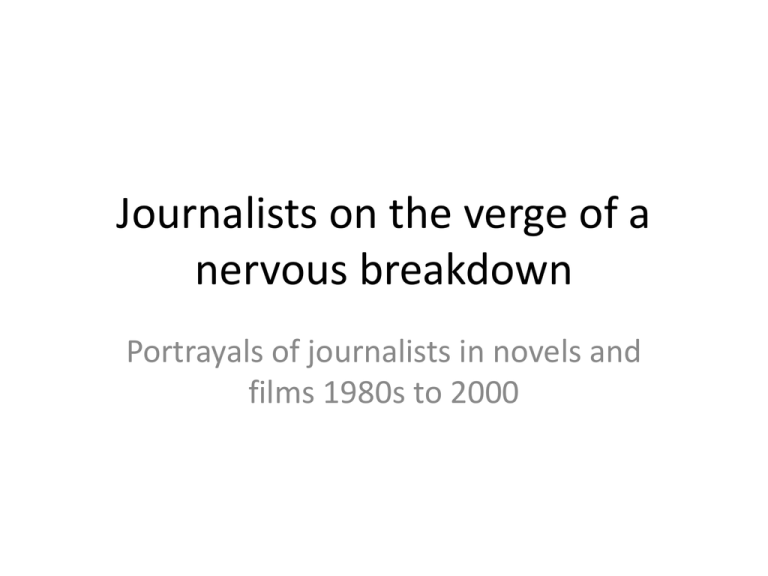
Journalists on the verge of a nervous breakdown Portrayals of journalists in novels and films 1980s to 2000 Key Texts • • • • • • • • Primary: Ian McEwan, Amsterdam, 1998 Iain Banks, Complicity, 1993 James Meek, We Are Now beginning our Descent, 2008 David Puttnam (dir) Defence of the Realm 1984 Secondary: Richard Shannon, A Press Free and Responsible, 2001 Raymond Snoddy, The Good, the Bad and the Unacceptable, 1992 Summary of British Portrayals so far • We’ve seen a steady change in the fictional portrayal of journalists since the early C20 • Early years are characterised by the ‘heroic’ reporter bringing the news to the newly literate masses, saving the world, and individuals from harm • Interwar years are characterised by portrayals mainly penned by nonjournalists, alarmed by the rise in the power of the press and asking questions about the role of journalism, particularly in warning and bringing the truth to the public as another war becomes inevitable • Post war years characterised by widespread post-war anxiety and alienation; characters are professionals yet their personal lives are dominated by insecurities and self doubt • Another big change in the portrayal of reporters and editors now occurs at the end of the C20/early C21 as new questions arise as to the role of journalism in society Context • • • • The 1980s and 1990s are characterised by increasingly extreme behaviour and sensationalism of the tabloid press Gave rise to then culture secretary David Mellor’s comment that the popular press was ‘drinking in the last chance saloon.’ ‘Such was the disgrace into which popular mass journalism had sunk, dragging the industry as a whole down with it…After June 1992 the question would be whether self-regulation would best, in the public interest, be abolished and replaced by legislation setting up some statutory regulation of the press with a view to compelling it to be accurate, unintrusive, decent, fair-minded and generally alive to its obligations and responsibilities to foster social and political advancement. (Shannon, p.2) Shannon suggests that the reason why the British tabloid press is so excessively intrusive and sensationalist is precisely because unlike the US and virtually every other Western country (apart from Australia which took its lead from UK) protection of the press, as enshrined, for example in the First Amendment, ‘is reciprocated by some degree of acceptance on the part of the press of a corresponding obligation of acknowledgement.’ Snoddy’s criticism • ‘Three characteristics seem to mark the behaviour of British newspapers: an almost pathological reluctance to admit errors and say sorry, a deep sensitivity to criticism and a marked distaste for thinking about what they do…The degree of complacency and defensiveness involved is a small symptom of a much greater malaise – the lack of self criticism in the newspaper industry…’ (Good, Bad etc, p 168-88) • That’s what has lead to Leveson Calcutt Committee • The Calcutt Committee on Privacy and Related Matters was established in 1989 following a series of tabloid outrages against politicians and the Royal Family; cheque book journalism, kiss and tells, invasions of privacy were commonplace • There were major fears in the newspaper world that the Committee would recommend abolishing the Press Council, established in 1953 after the first Royal Commission, and propose statutory regulation rather like the Broadcasting Complaints Commission. • A popular television actor Gordon Kaye, badly injured in a freak accident, lay desperately ill in Charing Cross Hospital. A reporter and photographer from the Sunday Sport contrived access…The Sunday Sport editor thought this a ‘great old fashioned scoop’…this was held to be a scandal too far. The Committee naturally took note of what instantly became a landmark in atrocious intrusiveness.’ (Shannon, p.26) Consequences for portrayals • Although previous portrayals have characterised some journalists as morally weak, indecisive, cruel, full of self doubt, they never expressed doubt going about their profession. Thomas Fowler, though betraying a ‘friend’ and his wife was a thoroughly professional journalist; John Dyson, though vain and self regarding nevertheless completed his duties well. Poppy, though wondering who read the Downingham Post, doggedly covered road accidents and court stories. • Late C20 portrayals of press reporters and editors however reveal a crisis both personally and professionally for the journalist characters, reflected the crisis of faith in journalism in society. Defence of the Realm • Even Defence of the Realm, a 1984 film which casts the state and proprietor as the ultimate ‘baddy’ the hero, a journalist, engages in some pretty underhand tactics (film). Certainly the newspaper as a business is seen as corrupt, hubristic and a million miles from Fourth Estate idealism – despite, still the existence of reporters who want to get at the truth. • (film passage) Iain Banks Complicity • Part thriller, part study of a man pushed to the brink with drugs, stress and his own healthy dose of self destruction (hand out – what does this introduction tell you about our character?) • The novel is about the effect covering something as traumatic as the Gulf War has on a journalist. Colley’s inability to cover the most important story he was presented with explains why he behaves so selfdestructively in the novel. (Basra Road handout, p290292): ‘the time of my failure and my simple, shaming incapacity to reap and work the obvious power of what I was observing; the place that exposed my incompetence, my hopeless inability to witness.’ Basra Road Basra Road close up Redeeming Feature • • • • His redeeming feature is his ability to examine his motives and criticise himself: introspection and self awareness: he knows he’s a shit “I feel like Judas, but there’s a way out; not with any honour, perhaps, but I’ve looked at myself pretty closely over the last few days and I’ve had to admit to myself that I’m not quite as wonderful a guy as I liked to think I was.” He also, was idealistic once, and thought that being a journalist would help him make the world a better place. His inability to communicate his disgust for man’s inhumanity is what makes him turn to self-destruction and drug-taking ‘I’ve imagined myself in situations like this, made up speeches in my head, speeches about truth and freedom and protection of sources, speeches I imagined delivery from the witness box just before the judge sentenced me to ninety days or six months or whatever for contempt of court, but I was kidding myself. Even if it’s true that I would have gone to prison to protect somebody else or make some dubious point about the freedom of the press, I know I’d only have been doing it to make myself look good. I’m just like everybody else: selfish.’ Vernon Halliday in Amsterdam • Vernon Halliday had no such ability: to that extent he was already dead when the novel began, not just at the ending. • Brief plot: A formerly glamorous and artistic good time girl, Molly Lane has died of cancer. At her funeral, three of her former lovers experience sorrow, loss and intense jealousy of each other. They are: • Clive Linley, Britain’s foremost modern composer • Vernon Halliday, editor of The Judge, a quality broadsheet with a struggling circulation • Julian Garmony the current Foreign Secretary • Also at the funeral is Molly’s long suffering husband George Lane, a wealthy publisher • Following the funeral the three men vie with each other, make pacts, betray each other and make disastrous moral decisions • At the end of the novel, Vernon and Clive end up dead and Julian, tipped to be the next PM, loses his job in a cabinet reshuffle. What does Amsterdam say about Journalism • • • • • • (read handouts) Vernon, the newspaper editor is morally bankrupt; the business has erased all normal decent instincts He himself acknowledges that he is an empty shell: The thought recurred to Vernon Halliday, during an uncharacteristic lull in his morning, that he might not exist... When he was alone, he was nothing at all’ – that’s the closest he get’s to self awareness The newspaper world McEwan creates has shades of Scoop: 'It's time we ran more regular columns. They're cheap, and everyone else is doing them. You know, we hire someone of low to medium intelligence, possibly female, to write about, well, nothing much. You've seen the sort of thing. Goes to a party and can't remember someone's name. Twelve hundred words.‘ Most of the other journalist characters in the novel are caricatures – the bitter foreign editor passed over for promotion, the dizzy female features editor, the old guard ‘grammarians’ on the subs desk desperately holding the line for decency McEwan is saying that the newspaper world is one where you rise to the top if you have no moral values. His choice of broadsheet paper is telling – the rot in the news industry is not just confined to the tabloids. What has journalism done to him? • His chair was empty; he was finely dissolved throughout the building, from the City Desk on the sixth floor where he was about to intervene to prevent the sacking of a longserving sub who could not spell, to the basement where parking allocation had brought the senior staff to open war…Vernon’s chair was empty because he was in Jerusalem, the House of Commons, Cape Town and Manila, globally disseminated like dust…he was widely known as a man without edges, without faults or virtues, a man who did not fully exist…perhaps he had already died’ (pp29/32) (How does this description compare to those of Ommaney, Bellamy and Ferrol in the Edwardian novels; the editor in the more recent Spike, however, does suffer the same malaise. (handout) Does journalism damage your mental health? • Is the incessant search for stories debilitating? • Is it the pressure to survive in a competitive commercial world too much for some to take? • Is the strain of being the ‘outsider’ or ‘observer’ too much to take? • Think about all the fictions we have looked at over the term. When did journalism move from corrupting society to corrupting the individual who practises it? Key to Vernon’s promotion • Vernon is hired to replace the ‘titans’ who went before him, the ‘gifted editors’ of the past, to take the ailing Judge downmarket. • He is not so much a great editor as a puppet of the modern information industry • Taking a great paper downhill with a story about Siamese twins biting each other’s face The novel is about the hypocrisy and cynicism at the heart of modern media • ‘In a week sales were up by a hundred thousand, and the editor was finding he was arguing into silence from his senior editors rather than protest; secretly they all wanted him to go ahead as long as their principled dissent was minuted. Vernon was winning the argument because everyone, lowly journalists included, now saw they could have it both ways – their paper saved, their consciences unstained.’ (p100) • He felt large and benign, a little ruthless perhaps but ultimately good, capable of standing alone (p101) • He no longer feels dead and empty – the story makes him feel alive We Are Now Beginning Our Descent, 2008 (One of the first novels to discuss journalism at length post 9-11) • James Meek was a reporter on the Guardian, before becoming a published novelist. • We are now beginning is very much semi autobiographical, about a journalist who wants to be a novelist, reluctantly accepting an assignment from his paper to cover the war in Afghanistan • Based on Meek’s own war reporting experiences, it portrays a journalist falling apart both spiritually and emotionally, scarred by what he has seen in the war zone • Losing all sense of perspective, he abandons his job and family to chase after a girl, Astrid, a features writer he has met in Afghanistan, in the false belief that she will provide him the answers he is looking for. But the affair only makes matters worse. • It’s another novel about humans trying to make sense of the madness around them with the ultimate conclusion that all you can do is care for the people you love and keep them safe (he returns to his family in the end) • In the novel the world of the foreign correspondent with its alienation, mad rushes of adrenalin and selfishness is a metaphor for everything that is wrong with modern life. • But, the novel concludes that it is better to have seen the madness of life and make a conscious decision to return to domesticity than never to have known what it was like. Better to have your senses flayed a little. Damaging profession • • • • • • The novel is also about how damaging the profession of foreign correspondent can be to the individual. (handout) American reporter Mark – has lost his hand, we presume while covering the Afghan war: ‘Mark had to work twelve hours of his Afghan day and he had to work twelve hours of his Californian day, the whole twenty four, no overlap. Kellas never saw him sleep.’ (p7) Paints a depressing picture of the foreign press pack (compare Scoop’s magnificent anarchy, to the squabbles over borrowing batteries and drinking each others’ milk) Unlike Cameron Colley, who begs his editors to send him to Iraq, Kellas at first refuses to go to Afghanistan…eventually does because ‘he wasn’t brave enough to be thought a coward’ (p13) Dinner party description (pp57-58) portrays him as arrogant, self-important and a nasty person – he behaves like a shit – but is it because he is travelling abroad the next day and he has loosened his grip already on conventional human relations?

